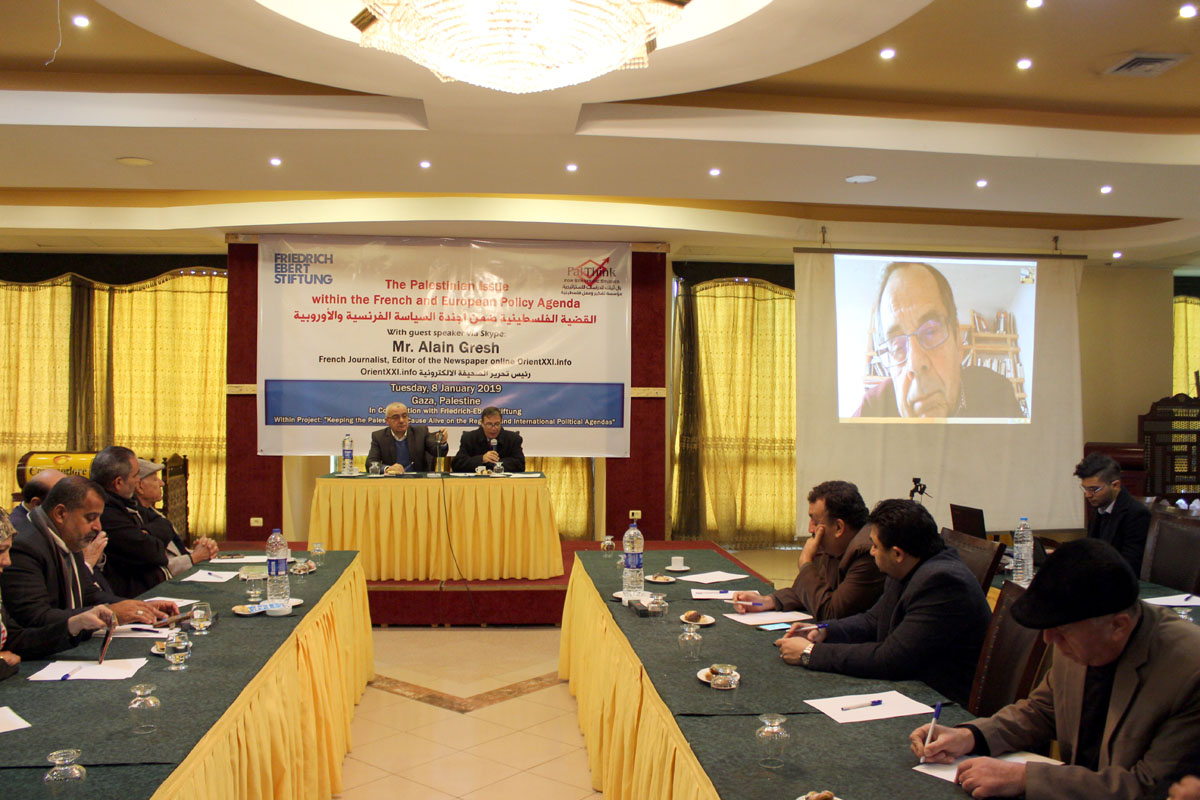The workshop entitled “The Palestinian issue within the French and European Agendas” implemented in partnership with Friedrich-Ebert-Stiftung within the project “Keeping the Palestinian Cause Alive on the Regional and International Political Agendas.” The session took place on Tuesday, January 8, 2019, at El-Commodore Hotel, Gaza City. The Guest Speaker is Mr. Alain Gresh; a renowned French journalist and editor of the online newspaper “OrientXXI.info.” More than 85 participants including researchers, activists, Journalists, NGOs professionals, and lawyers attended the conference to engage in discussing European policies towards the Palestinian cause.
Mr. Omar Shaban, director of Pal-Think, welcomed the attendees and noted that despite all challenges imposed on Gaza, Pal-Think for Strategic Studies as an independent organization continue to foster dialogue and to keep in touch with the international community, which connect people in Palestine with the rest of the world.
Dr. Usama Antar, the programs manager at the FES branch office in the Gaza Strip, noted the importance of the session’s topic, especially that France has been contributing financially to stabilize the situation of the Palestinian people, not to forget the proposed French initiative which was rejected by Israel, however at the moment, France seem not to be interested that much as it has been before in regard to the Palestinian issue.
Mr. Gresh started off refreshing the historical Israeli-French relations. Since 1967 most right and left parties were in favor of Israel, but after the French war on Algeria ended France wanted to play a semi-independent role in the Middle East, a position that differentiates its policy from the US. The period in 1974 France become more interested in the Palestinian issue, the Palestine Liberation Organization established its branch in Paris, and also that period certified the formation of foreign EU policy where the Palestinian issue became a priority. Also, one crucial view the EU adapted is that Palestinians have the right of determination and PLO has to be part of any solution for the conflict.
Most important of all back then was the Venice Declaration in 1980, which called for the acknowledgment of Palestinians’ right to self-government and the PLO’s right to be connected to peace initiatives. That time also many visits for President Yasser Arafat to France and many countries in Europe.
The French policy, in particular, played a significant role and impacted the view of the whole international community on the Palestinian cause back then. It was internationally agreed upon that an international peace only comes into existence if a fair settlement for the Palestinian issue has taken place. Then Oslo accord came into existence, regarding Oslo France played a role in relevance to finances not precisely politics.
Mr. Gresh noted that after the 2nd Palestinian Intifada, things changed very much, the EU relations with Israel developed particularly regarding trade affairs and educational collaboration. This change has not pushed France, however, to put pressure on Israel to settle for a fair solution for the Israeli-Palestinian issue. The change in the French policy was mainly caused by the emergence of different political parties in France, the Palestinian division and terrorism in Europe. At the same time, the public opinion in France believed in the idea that Palestinians deserve their right of determination.
Attendees participated in the discussion asking many questions; one important question was about France’s stance regarding the Deal of the Century in addition to other issues. Mr. Gresh noted that the French position was warning the PA from undertaking the Century Deal. Now, there is not a real diplomatic solution from all sides including the US, Israel to the whole conflict. The Israeli discourse is that there is not any difference between Hamas and ISIS. However, the EU position changes from time to time, but a solution cannot take place without all Palestinians parties coming together to participate in the peace process. Many French Jews are part of the BDS movement when it comes to French Jews moving to Israeli settlements is not that of a trend.
It is the Palestinians’ responsibility to sort their problems out; a significant issue is the internal Palestinian division, and it is easier for the Palestinians to stick to the two-state solution than looking for new solutions for the conflict. Efforts such as these exerted by the BDS movement does not affect the Israeli-French relations. Not to forget that the EU not to deal with Palestinian cause has no effect on relationships with other Arab countries, which does not impose much of a pressure on partners in Europe to intervene in a more practical way.
Currently, the Palestinian issue is not a top priority in the agendas of most French political parties; it is also the case for the French government. Other conflict areas issues like the war in Syria and fighting terrorism in the region are more important for France. Finally, Mr. Gresh noted that solving the problems of the Middle East starts with reaching a fair solution for the Palestinian cause in the first place.
















